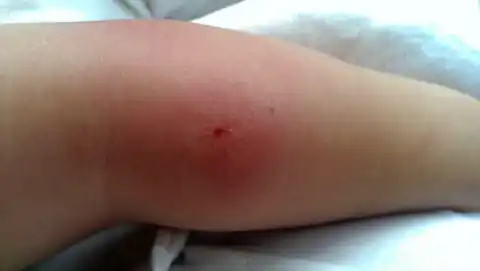The Itchy Truth
The Science Behind Mosquito Bite Reactions
That maddening itch from a mosquito bite isn't just an annoying side effect - it's the result of a fascinating microscopic battle happening right on your skin!

What’s Really Happening When a Mosquito Bites You?
When a female mosquito lands on you, she's not just after a quick snack - she's got a toolkit in her saliva that makes her job a whole lot easier. Her spit is loaded with over 100 different proteins, each with a special purpose:
Anticoagulants keep your blood from clotting, ensuring a steady flow.
Vasodilators open up your blood vessels for easy access.
Anesthetics numb the area, so you don't feel the bite at first.
Immunomodulators help her slip under your immune system's radar.
Thanks to this chemical cocktail, a mosquito can feed for up to three minutes without you noticing a thing. It's a sneaky system that's evolved over millions of years!
Your Body Fights Back
But your body isn't fooled for long. As soon as it detects those foreign proteins, your immune system jumps into action. The main culprit behind that itch? Histamine. This chemical causes blood vessels to widen and become leaky, which leads to the classic red bump, swelling, and - you guessed it - the maddening itch.
In fact, research shows the itch is mostly your body's reaction to the mosquito's saliva, not the bite itself. That's why the itching can sometimes get worse hours after you've been bitten.
Why Do Some People React More Than Others?
Not everyone reacts to mosquito bites the same way. Here's why:
Your Immune HistoryIf you're new to mosquito bites, your reaction might be pretty mild. But the more you get bitten, the more your body recognizes those mosquito proteins and ramps up its response. Kids, for example, often have bigger reactions because their immune systems are still learning. On the flip side, some people get desensitized over time and barely react at all.
Your GenesAbout 1 in 5 people are what scientists call "mosquito magnets." Genetics can make you more attractive to mosquitoes and more likely to have strong reactions. So if you always seem to be the one getting bitten at a barbecue, you might have your DNA to thank (or blame).
The Mosquito SpeciesNot all mosquitoes are created equal. Some species, like Aedes, have especially irritating saliva, while others might not bother you as much.
The Itch-Scratch Cycle
When histamine floods the bite area, it activates special itch nerves in your skin. Your brain gets the message, and you feel the urge to scratch. But here's the catch: scratching feels good for a second, but it actually makes things worse by causing more inflammation and more histamine release. It's a vicious cycle!
What Happens After a Bite?
Here's a typical timeline:
First few minutes: You probably don't feel anything, thanks to the mosquito's anesthetic.
Minutes to hours: Redness and itching start as your immune system reacts.
24–36 hours: The itch and swelling peak.
3–10 days: The bump slowly fades as your body clears out the mosquito proteins.
Why Are Some People Mosquito Magnets?
Science backs up what many of us have always suspected: some people really are more attractive to mosquitoes. Factors that make you a target include:
Your unique body odor (shaped by hundreds of chemicals and your skin bacteria).
How much carbon dioxide you breathe out (bigger people = more CO₂).
Your body temperature and even your blood type (Type O is especially appealing).
What you eat and drink (yes, a cold beer can make you more attractive to mosquitoes!).
How to Soothe the Itch
Knowing what's happening under your skin can help you fight the itch smarter. The best tactics:
Apply a cold compress to slow down blood flow and histamine action.
Use over-the-counter antihistamine creams to block the itch.
Try anti-inflammatory creams to calm your immune response.
That little red bump is more than just an annoyance - it's your immune system fighting off a tiny invader with a surprisingly sophisticated defense. The next time you're tempted to scratch, remember: there's a whole microscopic battle happening beneath your skin!
Further reading and references:
- Vander Does, A., Labib, A., & Yosipovitch, G. (2022). Update on mosquito bite reaction: Itch and hypersensitivity, pathophysiology, prevention, and treatment. Frontiers in Immunology, 13, 1024559. https://pubmed.ncbi.nlm.nih.gov/36211437/
- Wang, Z. Y., Nie, K. X., Niu, J. C., & Cheng, G. (2023). Research progress toward the influence of mosquito salivary proteins on the transmission of mosquito-borne viruses. Interdisciplinary Sciences: Computational Life Sciences. https://onlinelibrary.wiley.com/doi/10.1111/1744-7917.13193
- Ribeiro, J. M., & Francischetti, I. M. (2003). Role of arthropod saliva in blood feeding: sialome and post-sialome perspectives. Annual Review of Entomology, 48(1), 73-88. https://www.annualreviews.org/doi/10.1146/annurev.ento.48.060402.102812
